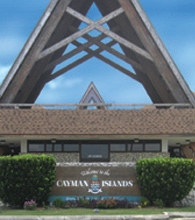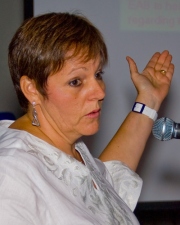Archive for July 20th, 2010

Hedge Fund Care helps Crisis Centre help children
(CNS): The Cayman Islands Crisis Centre’s Children and Youth Programme has helped 25 children since its inception in August 2009 and has since been expanded to incorporate youths up to the age of sixteen. With the help of grants from the Cayman Chapter of Hedge Funds Care (HFC), the programme focuses on the safety and well-being of children and youths who accompany their mothers to the centre as a result of domestic abuse.
CICC, who were awarded $35,000 in May 2010, were among six grantees to receive funding to assist with their ongoing efforts to eradicate and treat child abuse in the Cayman Islands. This was a renewal grant for the centre, having received circa $46,000 in 2008.
Charmaine Bush-Miller, Children and Youth Programme Case Manager said “In part the funding has been used to create and support my post which works directly with the children who accompany their mothers to the Centre. Prior to creating the Children and Youth Programme, 100% of our efforts were focused on the mothers. Children, who live in homes where domestic abuse occurs, more than likely have witnessed their father hurting their mother or have heard the loud angry voices and fearful screams that accompanies abuse. As a result, when the children come to shelter they are often confused, angry, and, or frightened. Now with the Children and Youth Programme there is a staff member designated and trained to work directly with the children to help them understand why they are at the Centre and teach them to deal with their feelings surrounding the abuse.”
The HFC grant also supports the CICC After Care Programme. Under thedirection of long-time staff member Lorna Medina, the After Care Programme provides follow-up and assistance for women and their children when they leave the safe shelter. Shortly after the inception of the Crisis Centre, Ms. Medina, a native and long time resident of the Cayman Islands began working on a voluntary basis with the women after they left the shelter. Through HFC funding the After Care Programme became an official and much needed component of CICC.
Charmaine who has a Bachelors Degree in Psychology has been employed since July 2009. She applied for the position following an internship at the centre during the summer of 2004. The internship served to fulfil a course requirement as a graduate in psychology from Ave Maria University – Latin American Campus, located in Nicaragua. During this time, Charmaine worked side by side with the outreach coordinator to increase awareness of child sexual abuse in the Cayman Islands.
During their stay, the programme offers children and youths assistance to counter anxiety, self blame and identification and address of post traumatic stress disorder symptoms; individual and group sessions geared towards enhancing self esteem and safety; support groups to facilitate effective communication skills, healthy coping mechanisms, self awareness and conflict resolution; family support groups to enhance parent child interaction; academic assistance; referral services for children battling with anger management, child sexual abuse and other identified problems which impede a child’s normal developmental process; information to parents on parenting skills, prevention of child sexual abuse and the effects of domestic violence on children.
Additionally, the programme offers support in helping children deal with the challenges that face them academically and changing learned behaviour copied from what they see. It also provides support to parents who often have to adjust to having a lack of funds due to the abuser or them leaving the marital home. Costs surprisingly include bilingual materials as English is not the first language of the majority of clients.
The crisis centre is open to all victims who have made contact via phone, who do not have a child over 16 years of age or any pets that they would need to bring with them. The length of their stay varies but is up to a maximum of six months.
The current staff discipline is six full-time staff that cover a 24 hour shift pattern and operate a 24-hour crisis helpline.
Charmaine added, “The most rewarding part of my role is the positive outcome we see when intervening to break a pattern of unhealthy behaviour, which most of the time stems from witnessing domestic violence. The changing process is satisfying because we are able to distinguish between a child who initially enters the shelter with mixed emotions, questioning their self value and demonstrating much aggression towards their peers and relatives, to a child expressing eagerness to participate in group sessions, articulating their wants and needs assertively and improving their self as a whole. The physical ailments of domestic violence are always eye opening and making the smallest difference is hugely rewarding.”
Looking forward the CICC has a very ambitious development programme for their clients. They are looking for donations to assist with the expansion of their children’s playroom and to pave and landscape their front garden area.
For more information on how you can contribute to HFC, contact Claire Lloyd-Hickey at claire.lloyd-hickey@ogier.com
Hedge fund industry professionals established Hedge Funds Care (HFC), a charitable organisation focused on assisting young victims of abuse in 1998. Since that time, chapters have opened in New York, San Francisco, Chicago, Atlanta, Boston, Denver, Toronto, Cayman and London. The targeted groups for the organisation include those organisations with interests inhedge funds, including investment managers, investors, prime brokers, attorneys, accountants, administrators and information providers. Since its inception, Hedge Funds Care has distributed over $21 million through more than 600 grants.
$9 million shelter for the Brac
(CNS): The UDP government has started a major capital project on Cayman Brac. Work has begun on a hurricane shelter, with a main hall and 80 private rooms, located east and adjacent to the playing field on the Bluff, with access via Major Donald Drive. The planning application gives the total cost of the project as an estimated $9 million, though Deputy Premier Julianna O’Connor Connolly, who is second elected member for the Sister Islands, believes it will cost between $7.5 and $8.5 million to finish. She says it will be completed over a three-year period.
Planning approval has been given to the two-story 36,111 square feet building. Site preparation and purchase of some preliminary resources was achieved with the $500,000 in last year’s budget, and another $900,000 in this year’s budget will almost complete the main hall, O’Connor Connolly told CNS.
According to the plans, in phase 1 (the main building) the first storey will include the main hall, plus a sick bay, reception area, kitchen and several bathrooms. The second floor will include the command centre, office and conference room. Phase 2 consists of four 2-storey “wings” to the building, each wing with 10 private rooms on each floor, each room with a semi-private bathroom (one for every two rooms).
“One of the lessons of Paloma was that there were too many needs for one hall,” O’Connor Connolly said, noting that the rooms will have individual temperature control. She said that during Hurricane Paloma, some people were too hot and some were too cold, and that there was no privacy for the elderly or disabled.
The main hall will accommodate up to 400 people in a storm and each wing can house an additional 100 adults, so the new building adds another 800 shelter spaces to Cayman Brac.
This will be a multi-purpose building that will be used for inside sports, such as squash, badminton, netball and basketball, and with the rooms it can accommodate visiting teams, as well as for conferences and retreats, O’Connor-Connolly said.
When there is an emergency, the private rooms will be allocated on a ‘first come, first serve’ basis, though the deputy premier said that if a major hurricane was approaching they could allocate one wing for hospital patients.
This new emergency shelter will be the fourth on the island. The Aston Rutty Civic Centre on the Bluff can hold approximately 500 people, while the West End Primary School, which has been structurally upgraded since Paloma, can hold 250, and the Brac Day Care Centre, located next to the civic centre, can hold 155.
The District Administration Building, while not an official emergency centre, also shelters DA staff and their families, and the rebuilt Veteran’s and Seaman’s Center is also an unofficial shelter. In addition, many new homes are being built on the Bluff, where people remain during a storm.

‘Operation Heron’ postponed
 (CNS): Updated Tuesday 4:40 pm – Due to inclement weather and concern about the occurrence of lightning and the safety of volunteer passengers, the Cayman Islands Airports Authority (CIAA) and the Airport Emergency Exercise Committee have voted to postpone the planned mock aircraft accident scheduled for tonight. Weather permitting, the exercise will take place on Tuesday, 27 July, the CIAA said Tuesday afternoon. “Operation Heron” was scheduled to be staged this evening in the vicinity of Owen Roberts International Airport on Grand Cayman, and motorists were warned to expect to encounter periodic traffic disruptions.
(CNS): Updated Tuesday 4:40 pm – Due to inclement weather and concern about the occurrence of lightning and the safety of volunteer passengers, the Cayman Islands Airports Authority (CIAA) and the Airport Emergency Exercise Committee have voted to postpone the planned mock aircraft accident scheduled for tonight. Weather permitting, the exercise will take place on Tuesday, 27 July, the CIAA said Tuesday afternoon. “Operation Heron” was scheduled to be staged this evening in the vicinity of Owen Roberts International Airport on Grand Cayman, and motorists were warned to expect to encounter periodic traffic disruptions.
The staging of the exercise will inevitably result in some minor but essential inconvenience to the public and the CIAA is asking for understanding and cooperation. The Airport Emergency Committee comprises representatives from the Cayman Islands Airports Authority, Airlines, 911 Emergency Communications, Government Information Services/Joint Communications Services, Hazard Management Cayman Islands, the Royal Cayman Islands Police Service, the Cayman Islands Fire Service, the Cayman Islands Health Services Authority, the National Roads Authority, the Department of Environmental Health, the Port Authority, the Red Cross and the Port Authority.

ICTA upholds net neutrality
 (CNS): The use of technology that would give internet service providers (ISPs) the ability of to manage internet traffic, by accelerating or “throttling” particular protocols or applications, has been denied. A public consultation on the use of Deep Packet Inspection (DPI) and similar technologies, which began in July 2009 ended with the Information and Communications Technology Authority (ICTA) determining that the current use of this technology by two ISPs – Digicel and WestTel’s – was in breach of their ICT licences. Similarly, the ICTA found that LIME would also be in breach of its license if it implemented its planned use of DPI.
(CNS): The use of technology that would give internet service providers (ISPs) the ability of to manage internet traffic, by accelerating or “throttling” particular protocols or applications, has been denied. A public consultation on the use of Deep Packet Inspection (DPI) and similar technologies, which began in July 2009 ended with the Information and Communications Technology Authority (ICTA) determining that the current use of this technology by two ISPs – Digicel and WestTel’s – was in breach of their ICT licences. Similarly, the ICTA found that LIME would also be in breach of its license if it implemented its planned use of DPI.
The authority also recommends that changes be made to the ICTA Law in order to significantly restrict the use of DPI in the Cayman Islands.
The ICTA said it had two primary concerns with respect to DPI – privacy and net neutrality. Regarding the former, the authority said, “Not only does DPI permit the examination of packet headers, including source and destination IP addresses (which, in some instances, may also be considered personal information), but allows an ISP to examine the content of an electronic communication. The Authority is not convinced that examination of content is essential for traffic management (or any of the other purposes listed above) and views this practice as an unreasonable invasion of an individual’s privacy.”
Commenting on the threat to net neutrality, the ICTA said that in order to promote online innovation, it is crucial that the Internet remain “neutral. The authority said did not support ISPs granting exclusive or preferential access (higher bandwidth levels) to certain providers or applications selected by the ISP. “The Authority considers that the use of DPI should not be permitted in the Cayman Islands if it undermines net neutrality principles, either directly or indirectly.”
Law firm Appleby submitted that the intent of the ICTA Law is to treat the transmission of data over the Internet in a similar manner as the sending of traditional letters, “No-one would seriously suggest that the Cayman Islands Post Office should open letters and treat them differently according to the type of correspondence they contain. We believethat if DPI had been available at the time the Law was passed, the legislature would not have permitted its use.”
Appleby further noted: “We have serious concerns as to the effect the use of DPI would have on the confidentiality of communications sent to and from Cayman, and the level of trust that clients feel able to place in the integrity of the system. It is notable in this regard that, as far as we are aware no other offshore financial centre deploys DPI. Doing so would therefore risk imposing on Cayman a significant competitive disadvantage.”
In its submission Walkers noted that with the use of DPI, ISPs could attempt to give priority to traffic from specific subscribers based on their type. “This could provide an unfair advantage to certain ISPs and their subscribers over others that do not use DPI or similar technologies. If ISPs begin giving priority to specific types of traffic, this could cause application developers to begin camouflaging their traffic as other types of traffic in order to receive higher priority. In the long-run, this would make DPI less effective.”
LIME maintained that DPI would allow the enforcement of agreements with customerswith respect to download speeds and usage. The telecommunications firm also said it could get a better understanding of the IP traffic profile of its Internet and backbone, make more effective routing of traffic on its Internet network, assist in the development of customized services and billing, and protect the network and the service quality offered from exposure to security threats.
Digicel said that DPI enables an ISP to monitor network traffic usage in real time to meet the ever increasing risk to the services provided. The firm said the value to the provider and the subscriber in prevention of fraudulent attacks on both justifies the use of DPI as a precondition to the provision of the service, though it did acknowledged that DPI can be used to carry out intentional interception of messages sent by a subscriber, but claimed it does not use DPI for these purposes.
WestTel confirmed that it employs equipment to manage its traffic loads efficiently and ensure that the majority of its customers experience expected bandwidth. WestTel noted that the bandwidth allocated to Peer-to-Peer (”P2P”) usage for residential customers is limited to 4 to 12 KB/s upstream and 8 to 150 KB/s downstream. Among corporate customers, this equipment is only used upon request if a corporate customer wishes to manage its internal traffic in a more efficient manner.
All documentation and submissions regarding this public consultation are posted on the ICTA website.

Call for wildlife protection
 (CNS): At the final public meeting hosted by the Department of Environment (DoE) to discuss the New Conservation Law, Cayman Brac residents asked how soon could the law be passed and raised concerns that it did not go far enough. Brackers wanted to know if small areas, such as nesting places of turtles, would be protected, as well as the shrimp hole on the south side, which, it was noted, was being polluted by runoff from the landfill. A rare cactus found only on Cayman Brac that grows by the side of the road is continually mowed down by Public Works Department, and the rock iguana population, already in decline, is further reduced on a regular basis as many are killed on the road. (Left: DoE Director Gina Ebanks-Petrie – Photo by Dennie Warren Jr)
(CNS): At the final public meeting hosted by the Department of Environment (DoE) to discuss the New Conservation Law, Cayman Brac residents asked how soon could the law be passed and raised concerns that it did not go far enough. Brackers wanted to know if small areas, such as nesting places of turtles, would be protected, as well as the shrimp hole on the south side, which, it was noted, was being polluted by runoff from the landfill. A rare cactus found only on Cayman Brac that grows by the side of the road is continually mowed down by Public Works Department, and the rock iguana population, already in decline, is further reduced on a regular basis as many are killed on the road. (Left: DoE Director Gina Ebanks-Petrie – Photo by Dennie Warren Jr)
In addition, Hurricane Paloma in November 2008 had taken a toll on wildlife, it was said; bats owls and tropic birds had all but disappeared, and these species needed additional protection. One resident suggested speed bumps on the south side road to reduce road kill.
So far, the owners of land on the Brac where turtle nests have been found have been co-operative, but residents asked, what if they weren’t? The law will protect large areas but Brackers wanted to know if it will also protect smaller but vitally important areas.
DoE Director Gina Petrie-Ebanks explained that small areas would be covered in the provision to protect critical habitats, which are identified and put on a map for anyone to see.
Under the new conservation law, the DoE would make conservation plans for any species they believed needed protection, and the public would have 28 days to comment before they went into effect. Such plans would allow the DoE to make broad recommendations about the preservation of species. As the law now stands, even for wildlife that is protected, such as the native iguanas, this protection is limited in its scope. Under the new law, the DoE would have the flexibility to make holistic protection plans for endangered and endemic species.
Residents bemoaned the fact that sometimes when land is cleared it is stripped bare, and of particular concern were those areas at the base and the edge of the Bluff since the Brown Boobies nest in the face of the Bluff. The DoE director explained that part of the critical habitat provision would identify the Bluff face (which is owned by the crown) as one such area; the land at the base and the top would remain in private ownership but the management requirements to protect the boobies would be controlled under the new law.
Answering a question as to how long an environmental assessment process would take, Ebanks-Petrie said that currently, when the Central Planning Authority or the Development Control Board process planning applications that require input from the DoE, they aim to do so within 14-days. Since the new law would allow the National Conservation Council to delegate functions to the DoE, she said she is hoping that for straight forward cases the department would still be able to deal with applications in the same way, so the council can deal with the big projects, and the DoE could deal with the smaller projects in a couple of weeks.
Concern for wildlife extended to the ocean and there were calls for more marine parks. It was also suggested that if they were named they would be more marketable – as Bloody Bay has been.
Ebanks-Petrie said that with part of the three year grant that the DoE received from the UK government under the Darwin Initiative they would take a comprehensive look at the marine parks and see if some areas should be extended. The DoE would be holding another round of public meetings to discuss this issue, she said.
MLA Moses Kirkconnell thanked the director and her colleagues for the presentation and said he looked forward to the final draft of the bill. He said the exchange had made his job (debating the issue in the House) much easier.

Humane Society crowded with unwanted pets
 (CNS): The Cayman Islands Human Society is overflowing with unwanted and abandoned dogs and the non-profit organisation is appealing for people to step forward and adopt a pet. News27 reports that there are currently 90 dogs at the shelter, and with few volunteers and limited space at the Humane Society, the animals are in desperate need of help. Shelter liaison, Twyla Escalante, said in some cases people leave the island thinking that they have left their dogs with new owners they think are responsible, but this turns out not to be the case. (Photo courtesy News27)
(CNS): The Cayman Islands Human Society is overflowing with unwanted and abandoned dogs and the non-profit organisation is appealing for people to step forward and adopt a pet. News27 reports that there are currently 90 dogs at the shelter, and with few volunteers and limited space at the Humane Society, the animals are in desperate need of help. Shelter liaison, Twyla Escalante, said in some cases people leave the island thinking that they have left their dogs with new owners they think are responsible, but this turns out not to be the case. (Photo courtesy News27)

Child neglect will be prosecuted, say police
(CNS): Police are warning parents and care-givers who leave children unattended throughout the school holidays that they could end up in court facing charges of neglect. Detective Inspector Christsandra Mitchell of the RCIPS Family Support Unit said: “We have been made aware that some children are being dropped off at local libraries in the mornings, in some instances before the libraries are open for businesses. Some are also being left in these buildings as late as 5.00 p.m., without food or any contact information for parents or care-givers.”
The RCIPS will be following up on every complaint received. We are asking library staff and other members of the community to be vigilant and report any incident or concern you may have regarding the welfare or well-being of a child – whether the child is in a public place or at home alone.
“Many parents/caregivers are seemingly not aware that these infrequent periods of abandonment can lead to criminal investigation,” said DI Mitchell. “The RCIPS will make every effort to bring before the courts persons who neglect children, who it is their duty to protect, to face the consequences of their actions that may amount to a criminal charge.”
Anyone who has any concerns should report the matter to their local police station or the Family Support Unit on 946-9185.

DER teaches labour law for cash
 (CNS): Businesses looking for ways to cut costs by cutting staff can now pay the Department of Employment Relations (DER) to learn the correct way to do so. Realising that interpreting the labour law can be challenging, DER said in a release, department officials have designed a four-hour course to help employers better understand the law, but are charging employers up to $1000 to sign up. The course covers issues such as pre-employment, compliance, termination, employer responsibility, and labour tribunal matters. Content can be personalised, based on each organisation’s need.
(CNS): Businesses looking for ways to cut costs by cutting staff can now pay the Department of Employment Relations (DER) to learn the correct way to do so. Realising that interpreting the labour law can be challenging, DER said in a release, department officials have designed a four-hour course to help employers better understand the law, but are charging employers up to $1000 to sign up. The course covers issues such as pre-employment, compliance, termination, employer responsibility, and labour tribunal matters. Content can be personalised, based on each organisation’s need.
Registration is $1,000 for groups of up to ten individuals, while pricing is negotiable for smaller groups. The registration fee includes all course materials and a completion certificate.
“We know that there are often interpretation issues with specific areas of the law,” DER Acting Director Robert Whittaker (above) explained. “The current economic crisis is forcing many companies to review their bottom lines and cut costs. This often includes staff termination and redundancies. Our intention is, therefore, to help companies understand any areas of the law with which they are unsure.”
Email Locksley Haylock at Locksley.Haylock@gov.ky for more information.